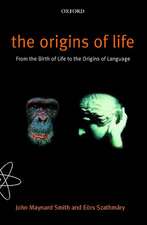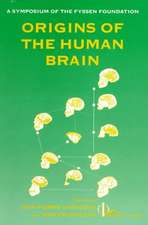Genetics: Genes, genomes, and evolution
Autor Philip Meneely, Rachel Dawes Hoang, Iruka N. Okeke, Katherine Hestonen Limba Engleză Paperback – 18 mai 2017
Preț: 457.95 lei
Preț vechi: 549.68 lei
-17% Nou
Puncte Express: 687
Preț estimativ în valută:
87.63€ • 91.72$ • 72.93£
87.63€ • 91.72$ • 72.93£
Carte disponibilă
Livrare economică 26 februarie-04 martie
Livrare express 21-27 februarie pentru 119.35 lei
Preluare comenzi: 021 569.72.76
Specificații
ISBN-13: 9780198712558
ISBN-10: 0198712553
Pagini: 776
Dimensiuni: 221 x 275 x 32 mm
Greutate: 1.61 kg
Editura: OUP OXFORD
Colecția OUP Oxford
Locul publicării:Oxford, United Kingdom
ISBN-10: 0198712553
Pagini: 776
Dimensiuni: 221 x 275 x 32 mm
Greutate: 1.61 kg
Editura: OUP OXFORD
Colecția OUP Oxford
Locul publicării:Oxford, United Kingdom
Recenzii
This is the book youve been looking for! A refreshing, new take on your classic genetics textbook. Its integrated approach successfully weaves basic and advanced topics, and leads students through the latest advances in the field.
A very well written book, which is easy to read and which includes many interesting examples, figures and videos. It ties different fields of genetics and molecular biology into a coherent entity using an evolutionary perspective.
An authoritative introductory genetics text which embeds all key concepts within their logical evolutionary framework.
There are many textbooks on genetics that take a purely molecular biology approach. It is good to have an evolutionary perspective on genetic knowledge.
I think that this book could be superior (to other textbooks) in linking the theory with the current knowledge of the genomic architectures of bacteria and eukaryotes and the state-of-the-art analytical approaches and technologies to address evolutionary questions.
Genetics text books can be rather dry. This one shows the relevance of genetics, molecular biology and evolution to modern life and also the impact of previous events (wonderfully explained) on humans today.
A great textbook, easy to read (almost conversational writing style), excellent combination of text and colour figures. I would definitely recommend it. It is fresh and up to date, and the big advantage of this book is that it combines various disciplines at the undergraduate level, making for a strong cohesion in teaching.
Meneely et al. use considerably teaching skills to capture the attnetion of students with a modest background in chemistry and biology. I particularly admire their attention to the three themes of their textbook. New topics incorporate what was learned in earlier chapters and students benefit in the review it provides and the integration of new knowledge it promotes. This is a volume that I hope will go through many editions.
A very well written book, which is easy to read and which includes many interesting examples, figures and videos. It ties different fields of genetics and molecular biology into a coherent entity using an evolutionary perspective.
An authoritative introductory genetics text which embeds all key concepts within their logical evolutionary framework.
There are many textbooks on genetics that take a purely molecular biology approach. It is good to have an evolutionary perspective on genetic knowledge.
I think that this book could be superior (to other textbooks) in linking the theory with the current knowledge of the genomic architectures of bacteria and eukaryotes and the state-of-the-art analytical approaches and technologies to address evolutionary questions.
Genetics text books can be rather dry. This one shows the relevance of genetics, molecular biology and evolution to modern life and also the impact of previous events (wonderfully explained) on humans today.
A great textbook, easy to read (almost conversational writing style), excellent combination of text and colour figures. I would definitely recommend it. It is fresh and up to date, and the big advantage of this book is that it combines various disciplines at the undergraduate level, making for a strong cohesion in teaching.
Meneely et al. use considerably teaching skills to capture the attnetion of students with a modest background in chemistry and biology. I particularly admire their attention to the three themes of their textbook. New topics incorporate what was learned in earlier chapters and students benefit in the review it provides and the integration of new knowledge it promotes. This is a volume that I hope will go through many editions.
Notă biografică
Philip Meneely (PhD, U of Minnesota) is a Professor of Biology at Haverford College where he has taught both introductory and advanced genetics for more than 20 years, as well as courses in genomics and bioinformatics. He previously was on the faculty of the Fred Hutchinson Cancer Research Center. His research with C. elegans has included publications on chromosome rearrangements, polyploidy, meiosis, sex determination, dosage compensation, and gene interactions. He is also the author of Genetic Analysis: Genes, Genomes, and Networks in Eukaryotes (Oxford University Press), now in its second edition, which was short-listed by the Royal Society (London) in 2015 for Undergraduate Biology Textbook of the year. Rachel Dawes Hoang (Ph.D. Cambridge University, UK) is an Associate Professor in the Biology Department at Haverford College. She has published research and review articles in the fields of developmental biology and evolutionary developmental biology. Her current research investigates the evolution of genes controlling cell shape changes as well as the interactions between endosymbiotic bacteria and host cells during embryonic development of insects. She regularly teaches courses in genetics, evolution, and development. She is currently the chair of the Biology Department. She is a former Helen Hay Whitney fellow.Iruka N. Okeke (PhD, Obafemi Awolowo University, Nigeria) taught biology at Haverford College, PA, USA from 2002 until 2014. She is presently Professor of Pharmaceutical Microbiology at the University of Ibadan, Nigeria and has also taught in other African and UK applied health programs. Her research on bacterial genetics and microbiology focuses on intestinal pathogens and on antimicrobial resistance. She is co-author of two books and about a hundred articles and chapters. She has been the recipient of Fulbright, Branco Weiss and Institute for Advanced Study (Berlin) Fellowships. Okeke serves on editorial, higher education, health policy and science policy advisory panels and boards in the US, Europe and Africa. Katherine Heston (M.S. University of Wisconsin, A.B. Princeton University) is an Instructor in Biology at Haverford College. She has been involved in teaching undergraduates for thirty years at Lake Forest College (IL), Northwestern University, Villanova University, and Haverford College. Her teaching background includes botany, ecology, genetics, cell and molecular biology. Working closely with students in the teaching lab has developed her sense of the student perspective, which informs her development of effective teaching materials for her classes.













